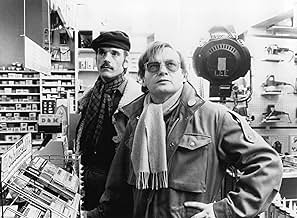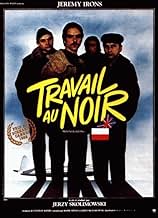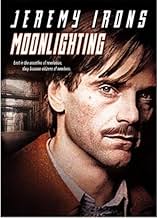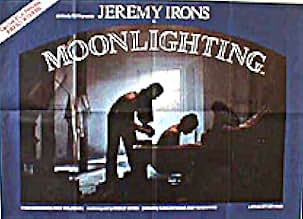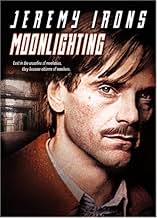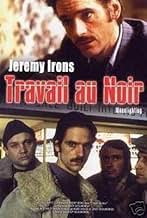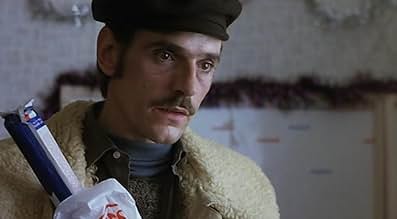Adicionar um enredo no seu idiomaNowak (Irons), a Polish contractor, leads a group of workmen to London so they can provide cheap labor for a government official based there. Nowak must manage the project and the men as the... Ler tudoNowak (Irons), a Polish contractor, leads a group of workmen to London so they can provide cheap labor for a government official based there. Nowak must manage the project and the men as they encounter the temptations of the West and loneliness and separation from their families.... Ler tudoNowak (Irons), a Polish contractor, leads a group of workmen to London so they can provide cheap labor for a government official based there. Nowak must manage the project and the men as they encounter the temptations of the West and loneliness and separation from their families. Nowak is the only one of the group who speaks English, and he uses this as a tool over hi... Ler tudo
- Direção
- Roteirista
- Artistas
- Prêmios
- 3 vitórias e 3 indicações no total
- Wolski
- (as Jirí Stanislav)
- Builders' Merchant
- (as Mike Sarne)
Avaliações em destaque
Can see whole-heartedly why 'Moonlighting' was so highly recommended, and would do the very same with fellow Jeremy Irons fans who haven't yet seen the film or with anybody looking for a non-UK/US film to watch. It really is deserving of all the praise it gets and is actually deserving of more in my view, actually know a lot of people who haven't even heard of it let alone not seen it and that really should not be the case. Always try to be subjective and hate it when so many people try to force their opinions onto others, but it does irk me sometimes when you have so many heavily marketed films that are sometimes mediocre at best or ones that are good but not that much. And then you have a film as great as 'Moonlighting', one of the best films of its year and of its subject, that despite critical acclaim is not marketed enough. In favour of films that audiences are more likely to see and have concepts and stories that they may be more likely to warm to perhaps. That should not have been, or be, the case, it deserved much better than that.
Yes the deliberate pace may test the patience for some, it is wholly dependent on the viewer, but to me that was not in any way a fault. Do think that the very end could have been rounded off a little more, though the climactic moments are powerful and the final shot is unforgettable.
Visually, 'Moonlighting' looks good. The setting has a lot of atmosphere that fits the tone of the film ideally and it's filmed with grit and style while bringing a claustrophobic edge that helped make things more powerful. Jerzy Skolimowski, exiled at the time, directs assuredly and never loses the vigour. Furthermore the script is an intelligently written one with some humorously satirical moments in deadpan fashion, and while more familiarity with the subject may help the story enthralled, entertained and moved, with a few disturbing twists in the mix like the identity of the only one who knows what's really happening in Poland. The shoplighting sequence is a major highlight, and there is a fair share of tension and poignancy.
Absolutely agree with anybody who says Irons' performance here is one of his finest, both pre-'Lolita' (and then his career became hit and miss when it became increasingly difficult to tell what to do with him or find enough roles that played to his strengths, that's my take though) and ever. It is graceful and understated but also full of authority and not many people are as good as Irons too when it comes to narration. The other performances are all great, but Irons is the one that the viewer remembers.
In conclusion, really great. 9/10
The story is about four Poles who come to London to work under the table rehabbing an apartment. Why? Well, Polish workers work for a lot less money than English ones and as long as they aren't caught, the scheme will pay off well for everyone. But only one of them (Jeremy Irons) speaks English and the rest spend much of the movie like the Darryls ("Newhart") or Harpo Marx...saying absolutely nothing. As the movie progresses, the more you see that this spokesman is very manipulative...and a most unusual character study of the man.
The story is told VERY economically...with little traditional incidental music and no fancy sets. It looks more like a high quality home movie than a big-time production. I am sure many will dislike the starkness and slow pace of the movie as well as the lack of emotion in the characters. They mostly seem depressed...which is understandable considering what eventually occurs in the picture. But it also makes viewing the film anything but fun.
Overall, this is an okay film which I didn't enjoy nearly as much as Siskel or some of the other reviewers did. Worth seeing? Perhaps...but not if you want a fun or traditional style movie.
A bunch of Polish builders arrive in London to renovate a house belonging to their boss. The foreman, Nowak, played quietly and brilliantly by Jeremy Irons, is the only one that speaks English. Their money is sufficient only for the tools, building materials and barely surviving.
This is a slow-burner film with every face hiding a deep anxiety, anger or fear, it's a wonderful experience for those who can appreciate true cinema. Irons carries the film single-handedly (often with inner monologue, since there are not many people to talk to) with few facial expressions but each one telling books of emotions.
You can literally taste the frustration of every character: the builders, working hard but not able to enjoy the western life that they finally see but cannot touch, are angry. (There's a very funny scene where one of them wants to buy Coca Cola on their first trip to the supermarket, exclaiming "Coke!" with childish glee, but their money is so limited that they can't afford even that.) The neighbors are angry, because the builders make too much noise. Most of all, Nowak is angry for a lot of reasons, although he never shows it: He misses his wife, and has growing doubts about the intentions of his boss about her. He speaks English, but doesn't always understand the subtleties of what the British people say. He has to deal with the men, the meager finances, the neighbors, the skip workers, and of course the house itself, which looks like it will come down if someone sneezes hard.
Two things change the course of their dull days dramatically: the money obviously won't last, and Nowak starts to come up with little schemes to get extra food from the supermarket using the same receipt. He's quite inept, but lady luck is often on his side. But most importantly, he hears that a military coup has taken place in his homeland. He faces a terrible dilemma: does he tell the men? He must, since they all have families at home, but then the work will never finish, and they really need the income. (There's no way they'll be allowed back, anyway) Or does he not tell them? Then the work may finish on time, but how will he keep the men from finding out themselves, when their weekly phone calls from home suddenly stop?
It's basically a hero story. What's a hero? A Marvel guy in leotards, speaking in one-liners? Or a man who does the right thing, at his own cost, knowing that he will never be appreciated? Nowak does the right thing. He hides the truth about the coup, thus keeping the men from rushing to the border and probably getting arrested. He gets the work done on time. He sees attractive women, but never chases them: they only remind him of how much he loves and misses his wife. He steals, but not from regular people: he only steals from the supermarket, and steals food and basic necessities only. And all the while he keeps his mouth shut. He doesn't "share his journey" or any other nonsensical stuff we love oh so much nowadays. He doesn't expect rewards, admiration, medals, approval, praise. He does the right thing, because he's a man, and that's what a man does. Even the final scene, where he tells the men about the coup and gets beaten by them for hiding the truth so long, is a tribute to this: He doesn't try to justify it, he knows he did the right thing but also hurt his men, so he takes their punches like a man.
As one other reviewer mentioned, it's a movie for the discerning viewer. There's nothing wrong with Marvel movies or action movies, but there's a lot wrong with thinking that's what movies are all about.
way it is treated. The basic situation is simple and somewhat routine; it's the way it unfolds that keeps interest high. The acting is fine, with Irons outstanding in the leading role. Unfortunately for me, I simply was not drawn to any of these characters by way of identifying with them. They seemed cold and self-absorbed, and in many ways quite pathetic. I felt as though I was observing rather than empathizing or becoming involved in their plight. Still, it is a very good film with strong production values.
Você sabia?
- CuriosidadesSkolimowski's Kensington house in West London was in real life undergoing renovation at the time the film was made. (Moonligthing, 1982)
- Erros de gravaçãoWhen one of the workers paints the door frame on the outside of the building and clears away the electrical wire, part of the lintel is already painted white. Later, when Banaszak climbs up the ladder, the lintel has not yet been painted. Then, in the close-up in which he gets the electric shock, a good part of the lintel is painted white again, and in the next shot, when he falls off the ladder, only a tiny part is painted white again.
- ConexõesFeatured in At the Movies: The Best Films of 1982 (1983)
Principais escolhas
- How long is Moonlighting?Fornecido pela Alexa
Detalhes
- Data de lançamento
- País de origem
- Idiomas
- Também conhecido como
- Vivendo Cada Momento
- Locações de filme
- Empresas de produção
- Consulte mais créditos da empresa na IMDbPro

